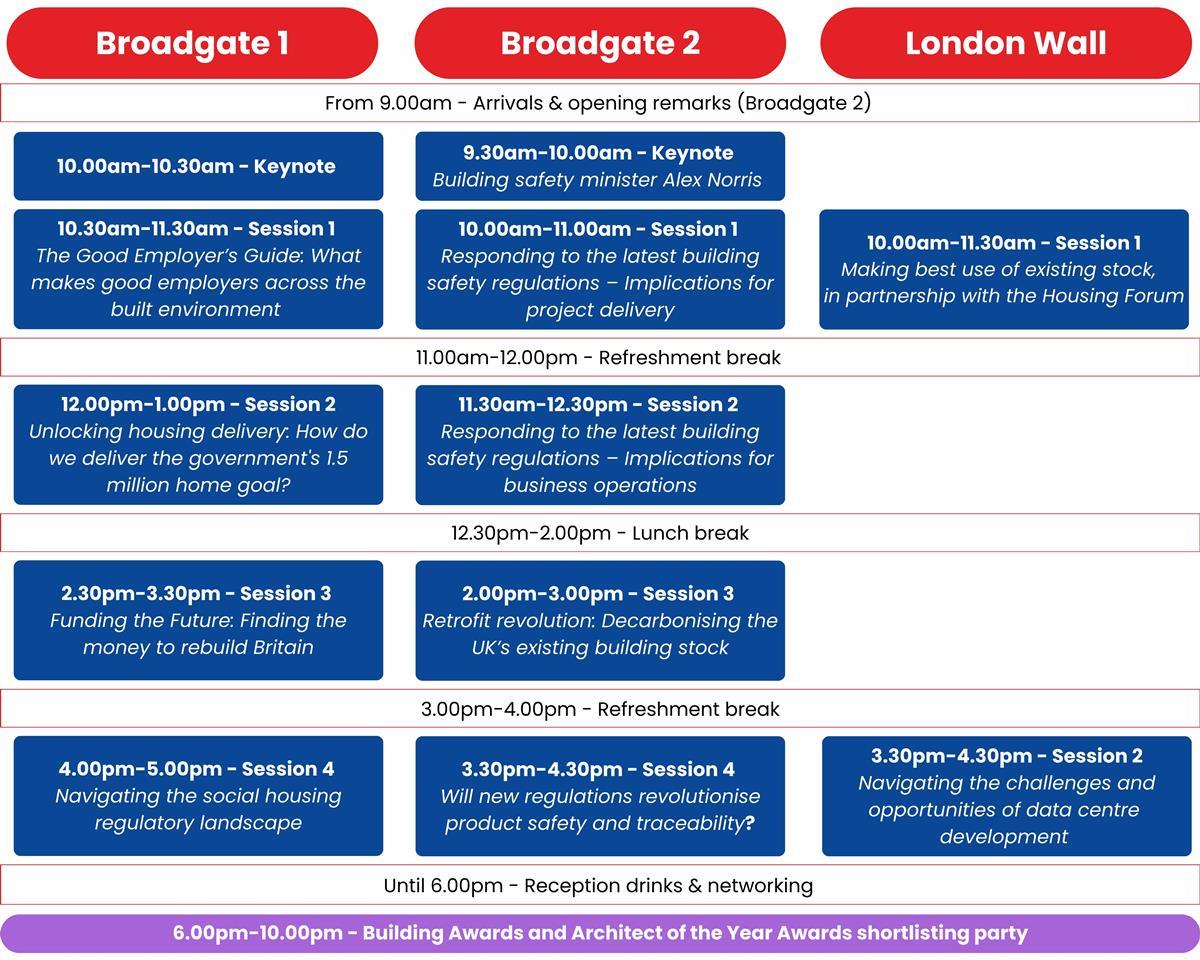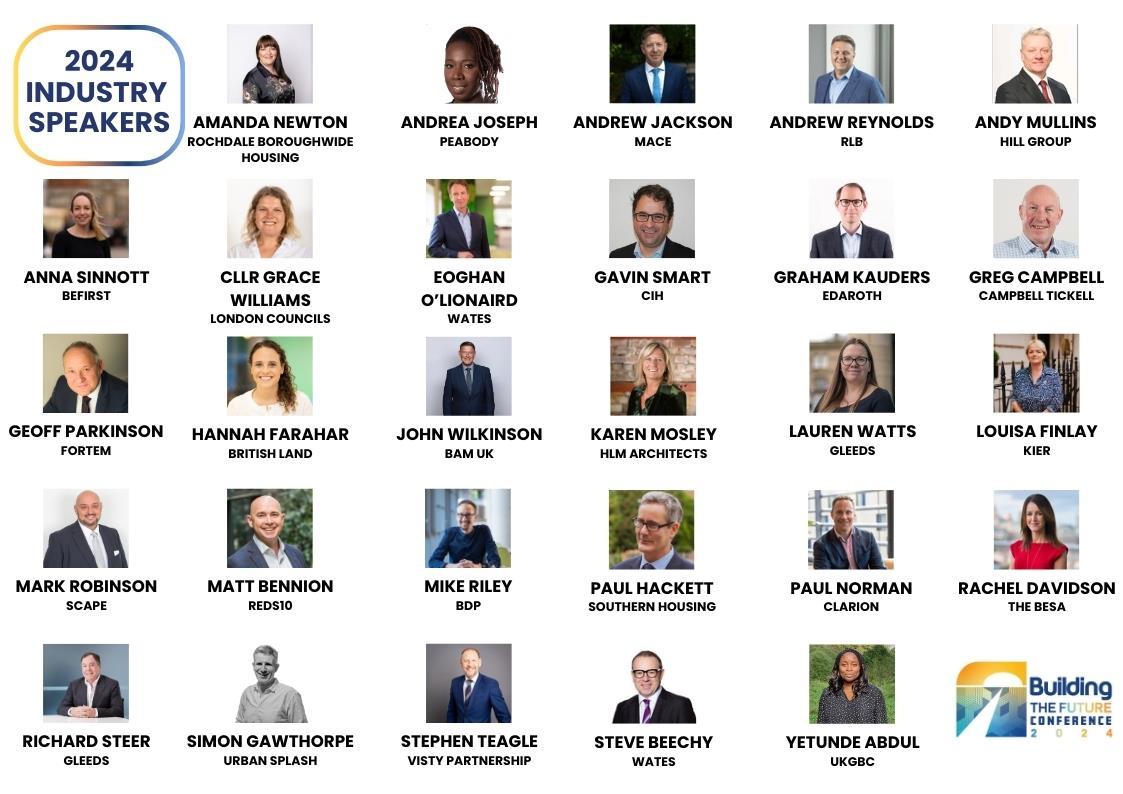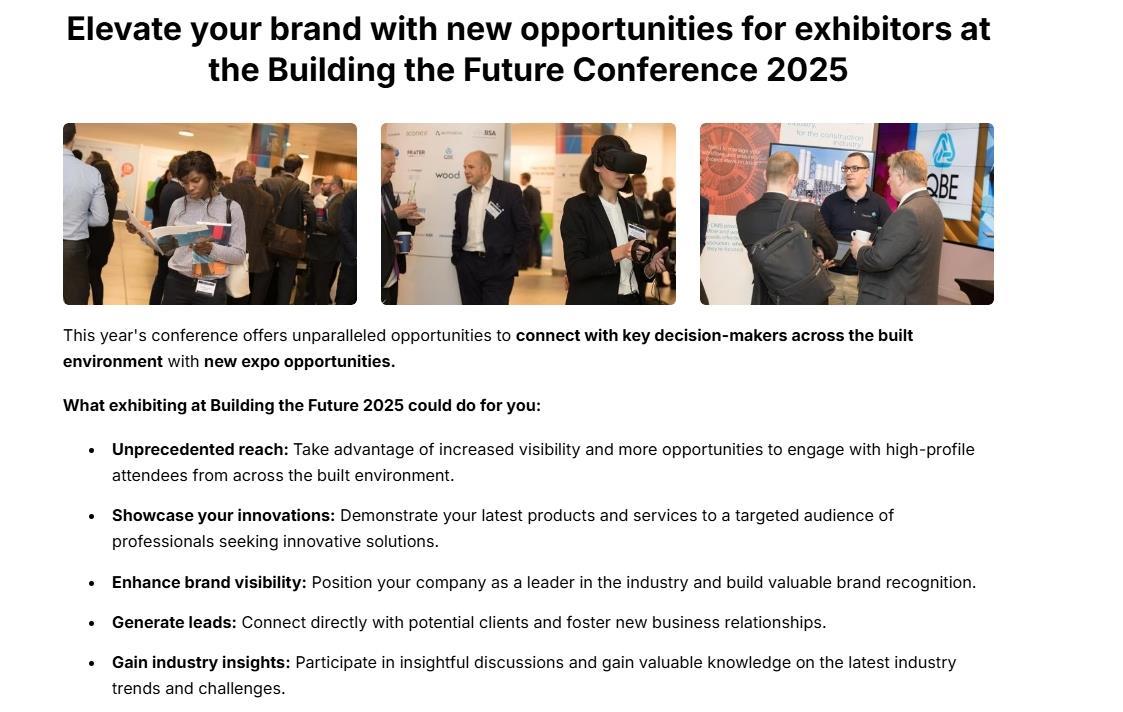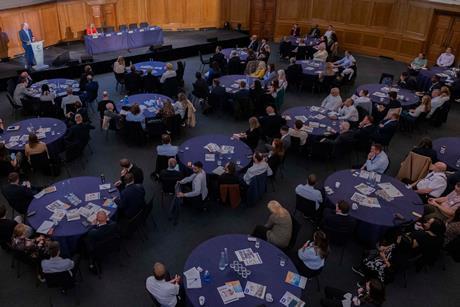- News

All the latest updates on building safety reformRegulations latest
- Focus

Save the Date: �ڶ����� the Future Conference 2025
2 October | 155 Bishopsgate, London
The �ڶ����� the Future Conference is back for its third and biggest year yet!
This year’s expanded programme brings together the �ڶ�����, �ڶ����� Design and Housing Today audiences under one roof.
Plus there will be plenty more to com from our leading industry partners such as Build UK, The Housing Forum, The G15, and UKGBC.
Then, in the evening, we are joined by those who have been shortlisted for the 2025 �ڶ����� Awards and Architect of the Year Awards to celebrate the industry's shining stars.
📅 Date: 2 October 2025
📍 Location: 155 Bishopsgate, London
Secure your ticket and join us for this unmissable event, where the brightest minds in the industry come together to shape the future of the built environment.
Explore the agenda below with more sessions still to be announced.
With thanks to:

�ڶ�����
Conference agenda

Keynote speaker: Alex Norris - �ڶ����� safety minister
Room: Broadgate 2

The minister for building safety, fire and local growth, Alex Norris MP, will be joining us as a keynote speaker at this year's �ڶ����� the Future Conference.
Norris was appointed to this role last year and has been the MP for Nottingham North and Kimberley since June 2017.
His role includes: building safety, regulations, the Grenfell Inquiry response, local and regional growth, investment zones and more. Join us on 2 October to hear his valuable insights and expertise, providing crucial context and perspective to important conversations around the built environment's future.
Responding to the latest building safety regulations – Implications for project delivery
Sponsored by:

Room: Broadgate 2
Time: 10.00am-11.00am
This session will delve into the sector’s response to evolving building safety regulations and their broader impact on construction, planning, and compliance. A particular focus will be placed on Planning Gateways 2 and 3, which introduce greater scrutiny at key project stages to ensure that safety is embedded from design through to completion.
Panellists will explore how these gateways are reshaping project approvals, risk management practices, and responsibilities across the supply chain.
The discussion will also consider proposed changes, such as the establishment of a single construction regulator and the role of a chief construction adviser in providing centralised oversight. These developments could significantly influence industry governance, accountability, and enforcement strategies.
Responding to the latest building safety regulations – Implications for business operations
Room: Broadgate 2
Time: 11.30am-12.30pm
As regulatory expectations grow, so too does the emphasis on professional competence. This second session will examine the frameworks being introduced to ensure that individuals working on high-risk buildings possess the skills, knowledge, and behaviours required to meet new safety standards.
Discussion will focus on licensing schemes, qualification requirements, and certification processes designed to elevate professional standards across the industry. Panellists will also highlight how these changes are likely to affect built environment businesses, projects, and workforce development strategies.
Industry experts will share successful approaches to building robust training programmes, supporting lifelong learning, and embedding a culture of continuous improvement. This session will underscore the importance of moving beyond compliance, showcasing how a commitment to competence and excellence can lead to lasting transformation in building safety practices.
Will new regulations revolutionise product safety and traceability?
Room: Broadgate 2
Time: 3.30pm-4.30pm
As the construction industry moves towards a new era of product safety, this session explores the latest regulatory advancements designed to enhance the integrity of building materials. The panel will examine the newly established general safety requirements and their transformative impact on the supply chain.
A key focus will be the introduction of digital product passports, showcasing how technology can revolutionise transparency and traceability in construction materials. The session will also delve into enhanced labelling standards, unpacking their implications for manufacturers, suppliers, and end-users alike.
The session will also examine the vital role of passive fire protection, assessing how improved material standards and installation practices can enhance the long-term safety of buildings. With increasing emphasis on product safety and traceability, the panel will discuss how digital tools such as product passports can support compliance and accountability.
Through a dynamic discussion, industry leaders will share practical strategies for implementing these new regulations, addressing both challenges and opportunities.
This session will equip participants with the insights and tools needed to navigate the evolving product safety landscape, ensuring compliance while fostering innovation in material integrity.
The Housing Forum Existing Stock Forum – in partnership with The Housing Forum
Making best use of existing stock – allocations, vacancy chains, downsizing and reducing use of temporary accommodation
Room: London Wall
Time: 10am-11.30am

The Housing Forum is the cross-sector body for the housing sector, with member organisations spanning the whole of the housing supply chain.
The Housing Forum's existing stock series of events focus on issues around asset management, decarbonisation and housing management, and are particularly popular with our housing association and council membership.
The Housing Forum has partnered with Housing Today for this Existing Stock Forum which will focus on how the whole of the housing sector can come together to ensure we make best possible use of social housing. Can we match households to housing more effectively?
What do we need to build to encourage older people in larger homes to downsize, or to allow overcrowded families to upsize, freeing up chains of moves within the sector?
Numbers in temporary accommodation are soaring and councils finding it harder than ever to build the new social housing that most people seek, putting ever-growing pressure on finances – can we be more creative with the way we use allocation schemes to incentivise people to find the best possible housing while they wait?
Unlocking housing delivery: How do we deliver the government's 1.5 million home goal?
Room: Broadgate 1
Time: noon - 1pm
The UK government has set an ambitious target to deliver 1.5 million new homes over the course of this Parliament—a goal that demands bold action, cross-sector collaboration, and fresh thinking across the housing system. This panel will explore the practical steps needed to unlock housing delivery at scale, with accelerating affordable housing provision across both the public and private sectors at the heart of the session.
Bringing together voices from government, local authorities, housing associations, and developers, the session will examine the barriers—policy, planning, finance, and land—and spotlight innovative approaches already making an impact. What are the biggest opportunities to boost supply? How can the sector align on outcomes that serve both growth and social equity? And what role should central and local government play in enabling delivery?
Navigating the social housing regulatory landscape
Room: Broadgate 1
Time: 4pm-5pm
As the regulatory landscape for social housing continues to evolve, staying ahead of compliance requirements is more critical than ever. This panel will explore the key elements of the current regulatory framework, including the new consumer standards, building safety obligations under the �ڶ����� Safety Act, and other pertinent legislation impacting social housing providers.
Our expert panel will delve into how these changes affect governance, resident engagement, accountability, and risk management. We'll examine practical approaches to implementing the new requirements, discuss the role of the Regulator of Social Housing, and highlight best practices to ensure compliance while maintaining high-quality service delivery.
The Good Employer’s Guide: What makes good employers across the built environment
Sponsored by:

Room: Broadgate 1
Time: 10.30am-11.30am
As the built environment evolves to meet new challenges — from net zero to digitisation to housing delivery and maintenance — the question is no longer just how to attract talent, but how to retain it and nurture careers that last.
This follow-up session builds on our Good Employers Guide Live discussions on the skills & DEI challenges, turning the spotlight on career progression, retention, and long-term development, as well as what makes businesses within the built environment first choice employers.
We’ll explore:
– New models for early career support, apprenticeships, and progression into leadership
– How employers can foster loyalty through purpose, inclusion, and opportunity
– The role of mid-career upskilling and cross-sector mobility
– Creating industry-wide frameworks that support careers, not just jobs
Retrofit revolution: Decarbonising the UK’s existing building stock
Room: Broadgate 2
Time: 2pm-3pm
With 80% of the buildings that will be in use in 2050 already standing today, decarbonising the UK’s existing building stock is one of the biggest—and most urgent—challenges in achieving national net zero targets.
This session will explore how the industry can scale up retrofit solutions across a range of building types, from homes to offices and public buildings.
We’ll examine the unique barriers and opportunities presented by different typologies:
– Residential: How can we accelerate retrofit housing stock at scale, ensure quality, and engage residents and landlords in the transition?
– Commercial offices: What role do landlords, tenants, and occupiers play in driving decarbonisation, and how can retrofits boost asset value and workplace performance?
– Public sector and community buildings: How can we leverage public funding and partnerships to upgrade schools, hospitals, and local authority estates?
Navigating the challenges and opportunities of data centre development
Sponsored by:

Room: London Wall
Time: 3.30pm-4.30pm
As demand for digital services and cloud computing continues to surge, the need for data centres is growing exponentially. However, developing these critical infrastructures presents unique challenges—from sustainability concerns and energy consumption to the complexities of network capacity and scalability. This session will explore how the data centre sector can overcome these hurdles while seizing new opportunities for growth, innovation, and efficiency.
We’ll dive into the key issues driving the evolution of data centre development, with a focus on:
– Sustainability considerations: How can data centres reduce their environmental footprint through energy-efficient designs, renewable energy sources, and circular economy principles? What role does cooling technology, waste heat recovery, and low-carbon innovations play in future-proofing data centre operations?
– Network capacity challenges: As data traffic increases, how can network infrastructure be scaled to meet the demand? What are the key bottlenecks, and how can industry stakeholders work together to optimise network capacity and performance?
– Location and resilience: Choosing the right sites for data centres, balancing connectivity, environmental risks, and regulatory considerations.
– The future of digital infrastructure: How emerging technologies, such as AI, 5G, and edge computing, will shape the future of data centre delivery and operational efficiency.
Funding the Future: Finding the money to rebuild Britain
Room: Broadgate 1
Time: 2.30pm-3.30pm
With public finances under increasing strain, the need for fresh thinking around infrastructure and development funding has never been greater.
This timely session, part of �ڶ�����’s new Funding the Future campaign, will explore how the construction sector can attract and deploy capital more effectively to get vital projects off the ground.
From large-scale infrastructure to essential assets — schools, hospitals, prisons and housing — how can we harness innovative funding models to keep Britain building?
The discussion will dive into the potential of public-private partnerships, blended finance, and new investment vehicles that can deliver real outcomes while managing risk and ensuring value for money.
Key themes include:
– Rethinking PPPs for today’s economic and political climate
– Optimising existing public and private funding frameworks
– Making investment count: how to turn capital into shovels in the ground
– What the construction industry needs from financiers—and vice versa
�ڶ����� the Future Conference 2024
Highlights from the �ڶ����� the Future conference 2024
�ڶ����� the Future commission conference delegates were invited in front of a TV camera at last month’s event to share their ideas to improve the built environment. Here is a selection of the audience’s views.
Previous speakers include:


Interested in partnering with us on the �ڶ����� the Future Conference?
Contact Cameron Marshall, commercial director, Assemble Media Group cameron.marshall@assemblemediagroup.co.uk�ڶ�����
With thanks to our national headline sponsors:
With thanks to our partners
BuildUK
The Housing Forum
UKGBC
- Previous
- Next
�ڶ����� the Future Think Tank research
�ڶ����� the Future Think Tank: The value of sustainability in the built environment
To coincide with the annual �ڶ����� the Future Conference, the �ڶ����� the Future Think Tank has today published three research reports.
�ڶ����� the Future Think Tank: Workforce of the future
To coincide with the annual �ڶ����� the Future Conference, the �ڶ����� the Future Think Tank has today published three research reports.
�ڶ����� the Future Think Tank: Balancing building safety and project viability
To coincide with the annual �ڶ����� the Future Conference, the �ڶ����� the Future Think Tank has today published three research reports.
Construction and immigration: How to make the points-based system fit to deliver industry growth
New research released today
Join us online
Use #�ڶ�����TheFuture
Site powered by























